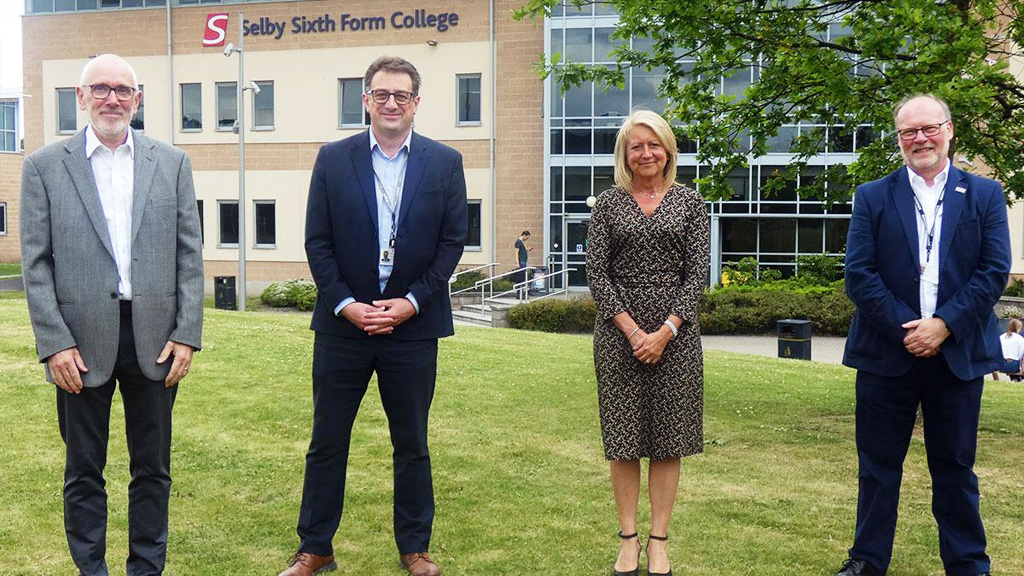The Governing Bodies of Selby College and Wakefield College have today announced plans to merge.
The new college group will serve the education and skills needs of residents and employers from their campuses in Castleford, Selby and Wakefield with a wider range of courses and apprenticeships at all levels and enhanced support for all.
Chair of Governors at Selby College, Richard Stiff, said: “We are delighted to confirm our intention to merge with Wakefield College. We are incredibly impressed by Wakefield College’s open and collaborative approach and its leaders’ strong focus on delivering excellence for the communities it serves, which matches our own track record.”
“It is clear our two organisations have similar cultures, values and aspirations and we believe that, together, we will provide a superb experience for the communities we serve.”
Andrew McConnell OBE, Chair of Governors at Wakefield College, said: “I am delighted at the prospect of us merging with Selby College. Over the last ten years, Wakefield College has been on an incredible journey, and we are now one of the strongest colleges in the country in terms of our financial position and our provision, which is continuously improving. Our aspiration is to be the absolute best, and we believe we will achieve this in partnership with Selby College.”
He added: “Skills development will be critical to the region’s recovery from Covid-19 and we are committed to combining our expertise to support our residents and employers in reskilling and upskilling to respond to and anticipate labour market needs. We will work with learners and businesses across West Yorkshire, North Yorkshire and into the East Riding, including in the town of Goole, as Selby College does now.”
Sam Wright, who has been Principal and CEO of Wakefield College since 2011, is to be the designated leader for the combined organisation. Phil Sayles, Principal and CEO at Selby College, will be leaving prior to merger to become Principal and CEO at Bournemouth and Poole College on the south coast.
Sam Wright said: “I am thrilled at the prospect of our two colleges coming together. Throughout the process, we have been struck by the clear synergies between us, and the exciting opportunities that this merger will present. Colleagues at Wakefield and I are really looking to working alongside the team at Selby College to make our joint vision a reality.”
Phil Sayles said: “Over the past months, whilst we have been exploring this opportunity, the commitment and passion that Sam and colleagues at Wakefield have shown has been fantastic. There is a real meeting of minds about how to work together and what we can build.
“This merger will strengthen the experience our students receive in college, with great study options and more resources to increase ‘wrap-around’ support and the vibrancy of college life. Lecturers and staff in the colleges will be able to work together to share expertise and resources.”
Sam Wright added: “We recognise the special place both Selby and Wakefield Colleges have for people in their local communities, and we want to maintain and enhance this. In addition, by combining our strengths under a powerful group structure, we will be able to accelerate our growth and deliver the best possible services for students and employers.
“Colleagues within the college, as well as students, are always at the forefront of our thinking and we firmly believe that joining together will add positive value to our staff bodies. We are looking forward to working together, sharing our expertise, and taking forward absolute best practice to build a superb institution that really delivers regional priorities.”
During the merger process the two colleges will consult extensively with all stakeholders – students, staff, employers and representatives within the communities the colleges serve, and the wider region. This statutory consultation will take place later in the year, with a plan to achieve merger in 2022.
The priority for both colleges will be to minimise disruption to students and staff and to ensure a seamless transition period. There will be no change to students’ chosen place of study, but they will have the added benefit of a wider range of resources and facilities, as well as enhanced course choices.
